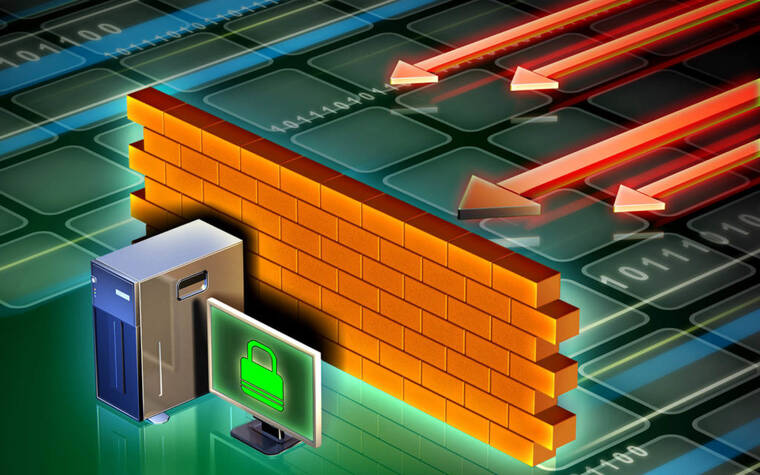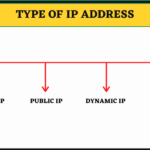The building has fire walls to stop the fire from spreading. The cybersecurity world has something similar - a firewall that stops malicious traffic from entering and spreading throughout an internal network.
Firewall Definition
firewall, also known asInternet Firewall, is a network security device (computer hardware or software) that helps protect your network by monitoring/filtering traffic (incoming and outgoing), as well as preventing unauthorized access to private data on your computer by outsiders.
Firewalls can not only block unwanted traffic, they can also help blockmalicious softwareInfect your computer.
Firewalls can provide different levels of protection. The key is to determine how much protection you need.
The following topics can help you understand what a firewall does and determine the level of protection that helps keep your computer and the data on it safe.
What does a firewall do
The firewall acts as a gatekeeper. It monitors attempts to access your operating system and blocks unwanted traffic or unrecognized sources.
How does it do it?
A firewall acts as a barrier or filter between your computer and other networks such as the Internet. You can think of a firewall as a traffic controller. It helps protect your network and information by managing network traffic. This includes blocking unsolicited incoming network traffic and verifying access by evaluating network traffic for any malicious intent, such as hackers and malware.
Your operating system and security software usually come with a firewall preinstalled. It's a good idea to make sure these features are turned on. Also, check your security settings to make sure they are configured to run updates automatically.
How does a firewall work?
First, the firewall system analyzes network traffic according to the rules. The firewall only welcomes incoming connections that have been configured to accept. It does this by allowing or blocking specific packets (the units of communication you send over a digital network) based on pre-established security rules.
A firewall acts like a traffic guard for a computer's entry point or port. Only trusted sources or IP addresses are allowed in. IP addresses are important because they identify a computer or source, just as your postal address identifies where you live.
Types of Firewalls
There are software and hardware firewalls. Each format serves a different but important purpose. Hardware firewalls are physical, just like broadband routers - stored between your network and your gateway. A software firewall is internal -- a program on a computer that works through port numbers and applications.
There are also cloud-based firewalls known as firewall-as-a-service (FaaS). One of the benefits of cloud-based firewalls is that they can grow with your organization, and similar to hardware firewalls, they do a great job of perimeter security.
There are several different types of firewalls based on their structure and function. Below are the various firewalls you can implement, depending on the size of your network and the level of security you need.
packet filtering firewall
A packet filtering firewall is a management program that blocks network traffic by IP protocols, IP addresses, and port numbers. This type of firewall is the most basic form of protection and is suitable for smaller networks.
But be careful. While packet filtering firewalls can be helpful, they also have limitations. Since all web traffic is allowed, the packet filtering firewall does not block web-based attacks. Therefore, you need additional protection to distinguish between friendly and malicious web traffic.
Proxy service firewall

A proxy service firewall is a system that can help secure your network by filtering messages at the application layer. It essentially acts as a gateway or middleman between your internal network and external servers on the network. Also known as a gateway firewall, it is more secure when it uses stateful and deep packet inspection techniques to analyze incoming traffic.
Stateful Multilayer Inspection (SMLI) Firewall
Stateful multilayer inspection firewalls have standard firewall functionality and track established connections. It filters traffic based on state, port and protocol, as well as administrator-defined rules and context. This involves using data from previous connections and packets from the same connection.
Most firewalls rely on stateful packet inspection to keep track of all internal traffic. This firewall is a step above packet filtering in using multiple layers of monitoring.
However, it still cannot differentiate between good and bad network traffic, so you may need additional software.
Unified Threat Management (UTM) Firewall
Unified Threat Management Firewall is a program that combines the functionality of an SMLI firewall with intrusion prevention and antivirus. Other services such as cloud management may be included under the UTM services umbrella.
Next Generation Firewall (NGFW)
Next-generation firewalls are more complex than packet filtering and stateful inspection firewalls.
Why?
Because they have a higher level of security that goes beyond standard packet filtering to inspect the entire packet. This means checking not only the packet headers, but also the contents and origin of the packets. NGFW blocks more sophisticated and evolving security threats such as advanced malware.
Network address translation (NAT) firewall
NAT FirewallAbility to assess internet traffic and block unsolicited communications. In other words, it only accepts inbound web traffic if a device on your private network requests it.
virtual firewall
Virtual firewalls are devices used in cloud-based systems (private and public). This type of firewall is used to evaluate and manage Internet traffic on physical and virtual networks.
Host-Based Firewall vs Network-Based Firewall
There are differences between host-based and network-based firewalls, and the benefits of both.
Network firewall filtering in and out of the internet to securelocal area network (LAN) traffic. They are typically used by businesses that need to protect their mainframe computers, servers, and employee networks. Network-based firewalls monitor communications between company computers and external resources and restrict certain websites, IP addresses, or other services.
Host-based firewalls work similarly, but are stored locally on a single computer or device. Host-based firewalls are software applications or suites of applications that allow for more customization. Installed on each server, they control incoming and outgoing traffic, decide whether to allow traffic to individual devices, and protect hosts.
Firewall History
Firewalls have certainly evolved and become more advanced over the years since the technology first entered the scene. Firewalls began in the late 1980s as basic packet filtering systems that monitor packets sent between computers. They now offer more advanced protection and technology, as highlighted in this timeline.
- The first generation of firewalls was developed in the late 1980s, as attacks on personal computers spurred the development of antivirus products.
- In the mid-1990s, Internet attacks on the network led to the emergence of second-generation firewalls; the first stateful inspection firewalls were introduced in 1993.
- In the early 2000s, third-generation firewalls addressed application-layer exploits, resulting in intrusion prevention system products (IPS).
- In 2010, an increase in targeted attacks gave rise to anti-bot and sandbox products.
- In 2017, larger attacks drove more advanced protections.
Do you need a firewall in your home?
Firewalls represent the first line of defense in home network security. Your home network is only as secure as its least protected device. This is where a cybersecurity system comes in.
A firewall shouldn't be the only consideration for securing your home network. It is important to ensure that all Internet-enabled devices, including mobile devices, have the latest operating systems, web browsers, and security software.
Another consideration? Protect your wireless router. This might include changing the router's name from the manufacturer-provided default ID and password, checking your security options, and setting up a guest network for your home's guests.
Why do we need firewalls?
You may have engaged in certain safe computer and internet use practices, including:
- You will not click on unknown links or attachments.
- You only log on to reputable and trusted websites.
- You will never disclose any personal information unless absolutely necessary.
- You have strong, unique, complex passwords for every online account you update frequently.
Does all this make you safe enough? The answer may be "no". If you use the Internet, it is wise to install a firewall. Cyber threats are widespread and evolving. It is important to use available defenses to help protect your network and the personal information stored on your computer from cybercrime.
Here are the three main risks of not having a firewall:
open access
Without a firewall, you would accept every connection to your network from anyone. You will not be able to detect incoming threats. This could leave your device vulnerable to malicious users.
lost or damaged data
Not having a firewall could leave your device exposed, allowing someone to take control of your computer or network. Cybercriminals may delete your data. Or they could use it for identity theft or financial fraud.
network crash
Without a firewall, an attacker could shut down your network. Getting it running again and trying to recover your stored data can cost you time and money.
Firewalls are a critical part of security technology, especially when different types of firewalls work together to provide an umbrella. Firewalls can help keep your network, computer and data safe.
Frequently Asked Questions about Firewalls
What is a firewall?
A firewall is a security device in the form of computer hardware or software. It can help protect your network by acting as an intermediary between your internal network and external traffic. It monitors attempts to access your operating system and blocks unwanted incoming traffic and unrecognized sources.
How does a firewall work?
A firewall acts as a barrier or gatekeeper between your computer and other networks such as the Internet. It acts like a traffic controller, monitoring and filtering traffic that wants to access your operating system.
What does a firewall prevent?
A firewall can help protect your computer and data by managing your network traffic. It does this by blocking unsolicited and unwanted incoming network traffic. The firewall works by evaluating this incoming traffic for any malicious intent (like hackers and malware that could infect your computer.
What are the types of firewalls?
As detailed above, there are software and hardware firewalls - several different types based on their structure and function. Hardware firewalls are physical and are stored between your network and your gateway. A software firewall is an internal program on a computer that works through port numbers and applications.
Do you need a firewall?
If you use the Internet, it is wise to install a firewall. They provide the first line of defense to help protect your computer and your personal information from a wide range of and evolving cyber threats.
Can firewalls be hacked?
A firewall shouldn't be the only consideration for securing your home network. It is important to ensure that all Internet-enabled devices have the latest operating systems, web browsers, and security software. You should also secure your wireless router. This might include changing the router's name from the manufacturer-provided default ID and password, checking your security options, and setting up a guest network for your home's guests.
Can a firewall prevent viruses?
Firewalls manage access to your network, while antivirus software acts as network protection from malicious viruses.
What is the difference between a hardware firewall and a software firewall?
Hardware firewalls are physical, just like broadband routers - stored between your network and your gateway. A software firewall is internal -- a program on a computer that works through port numbers and applications.
Do you need a firewall in your home?
Yes. Without a firewall, you can open yourself up to every connection to your home network. You will not be able to detect incoming threats. This open access may leave your device and personal information exposed and easily accessed and used for malicious purposes. These intruders may engage in malicious activities such as taking control of your computer or network, deleting your data, or using your personal information for identity theft and other online fraud.








